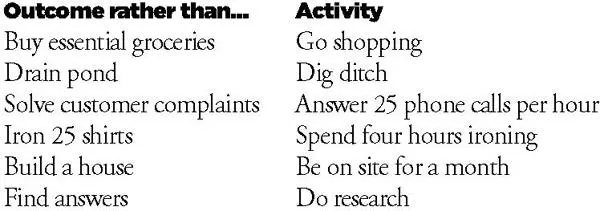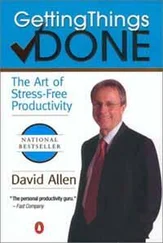Rus Slater - Getting Things Done
Здесь есть возможность читать онлайн «Rus Slater - Getting Things Done» — ознакомительный отрывок электронной книги совершенно бесплатно, а после прочтения отрывка купить полную версию. В некоторых случаях можно слушать аудио, скачать через торрент в формате fb2 и присутствует краткое содержание. Жанр: unrecognised, на английском языке. Описание произведения, (предисловие) а так же отзывы посетителей доступны на портале библиотеки ЛибКат.
- Название:Getting Things Done
- Автор:
- Жанр:
- Год:неизвестен
- ISBN:нет данных
- Рейтинг книги:5 / 5. Голосов: 1
-
Избранное:Добавить в избранное
- Отзывы:
-
Ваша оценка:
- 100
- 1
- 2
- 3
- 4
- 5
Getting Things Done: краткое содержание, описание и аннотация
Предлагаем к чтению аннотацию, описание, краткое содержание или предисловие (зависит от того, что написал сам автор книги «Getting Things Done»). Если вы не нашли необходимую информацию о книге — напишите в комментариях, мы постараемся отыскать её.
Getting Things Done — читать онлайн ознакомительный отрывок
Ниже представлен текст книги, разбитый по страницам. Система сохранения места последней прочитанной страницы, позволяет с удобством читать онлайн бесплатно книгу «Getting Things Done», без необходимости каждый раз заново искать на чём Вы остановились. Поставьте закладку, и сможете в любой момент перейти на страницу, на которой закончили чтение.
Интервал:
Закладка:
• When does it matter if you are doing something that isn’t your job?If you are distracted into other activities that are not included in your formal targets, but which prevent you from achieving your targets, or stop you achieving them on time, then you have failed. Therefore, if you take on extra things, make sure that you really do have time for them and they are for a purpose that’s relevant to you. For example, your boss is looking for a volunteer to do a departmental survey. Nobody else wants to take on this extra work, but you volunteer because you want to know more about how the department works and you want to network with people, not because you feel obliged.
• When does it matter if you are distracted into doing things for others in your non-work life?Of course it is good to be altruistic and to help others. However, some people become so distracted by helping others that they leave no time to do the tasks that are important to them personally. For example, when you find you are spending far more time helping with the school committee than helping your own children with their homework, then you need to step back from the situation, identify your real priorities and arrange your time better. Also, if you take on extra things to help others, make sure this is not just because you are procrastinating on something else you ought to be doing for yourself, or using the other thing as an excuse. For example, have you agreed to decorate your brother’s flat because you really want to help him, or because you are secretly putting off committing to that evening class you’ve been talking about for ages?
For more advice on this subject, see Chapter 5 on saying “no”.
Remind yourself of what’s really relevant in your workload.
1.5 Do the ‘right’ things right
The previous two Secrets in this book discuss doing what is ‘relevant’, but you also have to do what is ‘right’. There are various levels of ‘rightness’ to judge things by: moral, ethical, legal and practical.
• Moral, ethical and legal.Your personal morality and ethics will reflect the religious teachings and codes of law in your country. If you work for a global organization you may have to bear in mind differences between the moral and ethical norms in your native country and others you might come into contact with. Likewise, make sure that what you do is legally right under the laws of your organization, your country and any international laws affecting it. For example, few people would
case studyAn importer was making a margin of 4% on high-volume, low-cost, perishable stock. This did not feel ‘right’ in practical terms because it was a very low margin. Not only that, some of the importer’s customers were asking for more environmentally friendly and ethically produced stock that would fulfil the ‘right’ values for them. The importer decided to introduce another line of products that were less perishable and lighter to transport, and which sold for a 15% margin. By doing the ‘right’ thing, the importer was able to continue to provide the original stock to the loyal customers while also increasing the product range and customer base, and protecting and expanding the business.
“Real integrity is doing the right thing, knowing that nobody’s going to know whether you did it or not” Oprah Winfrey, American TV personality
consider that it would be doing the ‘right’ thing to sell alcohol-related products in a country that bans alcohol. That may be an extreme example, but the point is that to keep up your motivation, it’s essential that you do the things that feel ‘right’ according to your moral code, and to do them ‘right’ – or 100% correctly to the best of your abilities.
• Practical.There is a phrase in English: ‘busy fools’. This is used to describe people who are always busy and active but are doing the ‘wrong’ things. The ‘wrong’ things could be:
• Things which aren’t relevant (see Secrets 1.3 and 1.4).
• Things which your customer doesn’t want, need or value (see Secret 4.4).
• Things which are of lesser value.
Make sure that the things you do are ‘right’ in every sense of the word.
1.6 Plan for output, not activity
This piece of advice may seem obvious: we are looking at the subject of ‘Getting Things Done’ so of course we are going to plan for output (i.e. the end result) rather than the activity, aren’t we? And yet, in the real world we often plan things the other way round – for activity rather than output.
Part of this mixed up focus comes from our schooling or our parents and the way we were treated as children. “Oh yes, he practises his piano for an hour every day” is an example of the measurement of activity rather than output. Similarly, “We set half an hour of homework each day”, or “You will spend three years at university”.
All these approaches measure activity rather than output. Indeed, the output is expected to happen almost by chance. “If you spend an hour hitting piano keys each day you are bound to play a good tune eventually.” This encourages the child to become a ‘clock-watcher’: “When I’ve been hitting piano keys for an hour I can go and play.” The child then concentrates on the minute hand rather than focusing on the piano playing.
This behaviour tends to be carried on in our work life; we measure things by how long we are doing something rather than aiming to achieve a specific outcome in the available time. Of course, this is reinforced by the fact that we are often paid a salary of X per year, or Y per month, or Z per hour. Evidentally, it’s payment for the passage of time, not output!
So when you are setting yourself goals (or deciding what to do today) aim for the Outcome not the Activity.

With many tasks you will need to break them down into smaller outcomes in order to make them more visible.

This will help you to focus on getting things done, which will add a sense of urgency, allow you to measure your success and generally improve your morale as well.
It is very satisfying to see that you have achieved something, rather than just spending time doing something.
1.7 DREAM to get more done
You’ll often hear people say that they wish they had more hours in the day, or that they dream of having more time. Well now they can at least use the mnemonic DREAM to help them achieve more in the time they have.…
DREAM is a simple five-option way to manage the things that come into your in-tray during the working day – or the requests you get from your spouse/boss/customers/or staff.
When you receive a request for help or an instruction, decide immediately on one of these five courses of actions. Don’t ignore it or put off dealing with the issue.
1 Delegate it.If it is appropriate to do so, you should delegate it to either a peer or a subordinate. Delegating a job requires you to ensure that the person to whom you delegate has the skill, the time, the authority and the responsibility for completing the job to the proper standard and deadline. If you don’t ensure that they have all of these things, then you haven’t ‘delegated’, you have ‘dumped’! (See Secret 7.4.)
Читать дальшеИнтервал:
Закладка:
Похожие книги на «Getting Things Done»
Представляем Вашему вниманию похожие книги на «Getting Things Done» списком для выбора. Мы отобрали схожую по названию и смыслу литературу в надежде предоставить читателям больше вариантов отыскать новые, интересные, ещё непрочитанные произведения.
Обсуждение, отзывы о книге «Getting Things Done» и просто собственные мнения читателей. Оставьте ваши комментарии, напишите, что Вы думаете о произведении, его смысле или главных героях. Укажите что конкретно понравилось, а что нет, и почему Вы так считаете.












